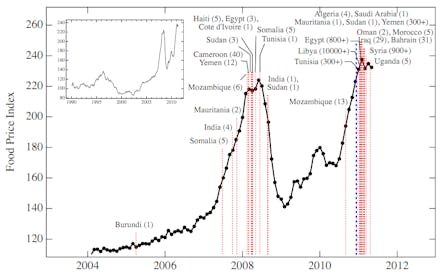A Mathematical Formula Predicted Today's Worldwide Protests Over a Year Ago

From Ukraine and Venezuela to Thailand and Syria, revolutions, protests and unrest are sweeping the globe. Are we just living in crazy times when everyone's angry at the same time, or is there more than meets the eye?
While each situation has its own complexities and particulars, complex systems theorists at the New England Complex Systems Institute hypothesized that the continuing rise of high global food prices could lead to uprisings around the globe. Over a year ago, Yaneer Bar-Yam of the NECSI published a paper that charted the rise of the FAO food price index — a UN measure that maps food costs over time — and saw that whenever that figure rose above 210, riots broke out around the world. The hypothesis held true for 2008's economic collapse and 2011's Tunisian protests. After Bay-Yam built the model, he was able to predict the Arab Spring just weeks before it happened, and now the numbers are checking out for 2013, the year with the third highest food prices on record.
"I have a long list of the countries that have had major social unrest in the past 18 months consistent with our projections," Bar-Yam told Vice. "The food prices are surely a major contributor — our analysis says that 210 on the FAO index is the boiling point and we have been hovering there for the past 18 months."
And just who's on that long list of countries waiting to explode: South Africa, Haiti, Argentina, Egypt, Tunisia, Brazil, Turkey, Colombia, Libya, Sweden, India, China, Bulgaria, Chile, Syria, Thailand, Bangladesh, Bahrain, Ukraine, Venezuela, and Bosnia. Each of these countries have seen skyrocketing food prices, and while that's not the only factor that leads to unrest and riots, hunger has often proven to be the spark that ignites the fire.
There is some good news though — at least temporary relief is coming soon, according to Bar-Yam's model.
"As to the trend for the next few months: Grain prices have gone down, starting with corn last summer," he said. "This has yet to propagate through the food system to lower prices, but they should drop soon. This may help reduce the unrest that is happening."
However, if the greater structural problems with global systems persist — especially financial speculation and food-for-fuel policies — the problems won't go away. And because of the globe's complicated web of food imports and exports, less stable countries are more susceptible to volatile prices and the riots that come from a 210+ FAO index.
Something needs to change soon or it's likely this will just keep happening. Numbers don't lie.